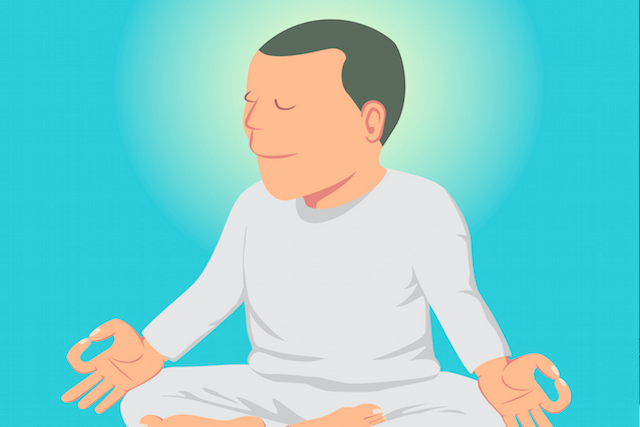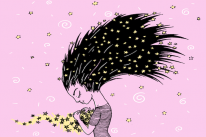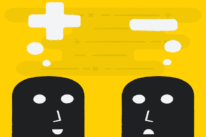
“There is only one way to happiness and that is to cease worrying about things which are beyond the power of our will.” ~Epictetus
Sweaty. Hot. Shallow breathing.
Thoughts barreled through my mind like a never-ending freight train. I couldn’t keep up. It was everything all at once, blurred into nothing in particular.
I felt like I was about to jump off a cliff, nervous anticipation building into panic. My head was spinning. My hands trembled.
Choking down a gulp, I forced the tears back that wanted to cascade down my cheeks in sobs. There would be time for that later. This wasn’t the place.
My heart raced. I was on edge. I was on the edge.
I’d catch glimpses of my thoughts as they rumbled through my brain.
Impending foreclosure on our old house. The psychiatric hospital I had been to six months ago. Bankruptcy paperwork that still needed finished.
The kids trying to make friends at their new schools. My wife playing with the budget for hours to make ends meet. Me falling asleep in my car left running in the closed garage.
I was at work. I was having a severe panic attack. And I had to go home.
Luckily, most of my anxiety attacks aren’t this severe. And thankfully, they don’t happen too often any more. Happily, this attack, which came out of nowhere and hit hard, disappeared as quickly as it came on.
The longer I deal with and work to manage my anxiety, the more I find I can learn from it. This in turn helps me cope better the next time anxiety comes along.
Here are some things I’ve learned about anxiety through my years of dealing with it:
1. Anxiety is a lie.
No matter how close to home anxiety hits, there is always a lie hiding in it somewhere.
Maybe it’s based on a false belief. Maybe the problem doesn’t have to be dealt with as immediately as it feels. Maybe there are options we haven’t considered.
But anxiety always—always—contains a lie. It might be big and in our face or it could be small, tricky and subtle. Look hard enough and we will uncover it.
One of the most powerful tools I’ve gained through working with a therapist on anxiety is learning to look for the lie. It’s difficult at first; we have to sit with our anxiety and pick through it a little bit at a time, and that’s certainly not a comfortable thing to do, but if we’re careful and patient we can find the lie. Finding the lie takes the teeth out of the anxiety.
And when we take the teeth away from anxiety, we can really begin to free ourselves. Anxiety needs a hook; it needs something to gnaw at us to keep it forward in our minds. By finding the lie and taking that hook away, we take away anxiety’s power over us.
2. “Should” should be a four-letter word.
Unreasonable expectations are, for me, at least, one of the biggest causes of anxiety. Some of the expectations I still struggle with are patterns of thinking that I can trace back to when I was a child. Because they’re so deeply engrained, they’re some of the toughest to get rid of.
When I was a kid, I was pretty smart. Things came easily to me. I learned quickly.
My parents, meaning to encourage me, told me I could do anything I wanted. And I believed them. And I started to expect anything I wanted out of myself.
When you’re a kid, you can get away with that. If I wanted to do something, I’d learn it and do it, end of story. As an adult, things became more complicated.
We can’t just want a particular job and make it happen. There are too many outside circumstances and other people involved. I should do that particular job isn’t just something that happens when you put your mind to it.
When we start thinking about how we should be, we can really get ourselves into a trap. We should be this to that person and this when we do that—we’re just continually setting ourselves up to fail. “Should” doesn’t allow for any wiggle-room or compromise.
“Should” can hurt us in other ways too.
3. “Perfect” should be a four-letter word, too.
I’m a bit of a perfectionist, so for me, being good at something isn’t good enough. I should be perfect, dammit! Please tell me you caught the “should” in that statement, right?
Perfectionism is my old reliable. My trusty friend. My almighty hammer.
The expectations that come from perfectionism can bury us alive. It’s a never-ending race that we’re never going to win.
No matter how much I want to, I will never be the perfect husband, father, or son. The amount of anxiety I have felt in my forty-two years of life trying to be one of these three things is immeasurable. Think about how much time I’ve wasted worrying about being something I could never be.
Perfect is such a damaging expectation, in any respect. When “good” or “just okay” will suffice in most situations, why do we torture ourselves chasing an impossible ideal?
The truth is, when perfectionists start settling for “good” is when we really start to shine. We’re unencumbered by the restraint of high expectation and that allows us to work to really high levels—levels we’ve probably been failing to hit in the past.
Anxiety comes about when we place these unattainable, perfect goals in front of ourselves. And our failures, which we will most certainly encounter, only serve to push us harder after our goals. Perfectionism becomes a never-ending cycle of anxiety and failure that we need to let go of.
4. Anxiety is an ultimatum.
The last lesson I’m taking away from this recent panic attack is this: anxiety always makes you an ultimatum. All or nothing. Black or white.
There is no gray area when it comes to anxiety. Now don’t get me wrong, anxiety will hide in the subtleties of our doubts, but it will force us into taking a black and white view of ourselves, our situation, or our surroundings. Anxiety leads us to think that we’ve got only one choice to make.
In my panic attack, I got overwhelmed by several different situations I’m dealing with right now. I am facing foreclosure on the house I’ve just moved out of. I am in the process of filing for bankruptcy.
My kids are having to adjust to being the new kids at their schools since we’ve moved. We do have to be careful with our money right now. I am scared that I will have to go back to the psychiatric hospital again—or worse.
But my anxiety attack turned all of these things into ultimatums for me. I felt like I had to resolve all of these issues at once (and immediately!) or the world would end. The fear I felt was so strong I was unable to think these problems through rationally.
Once I did get home from work, I cried myself to sleep. Waking up, I could feel that the fear had left me. I was able to look at myself, the anxiety attack, and my problems in a clear-headed manner.
What I saw was man suffering from anxiety, having been hit, but not harmed, by severe panic. I saw a man that was regaining his composure, a man who was moving on. I saw a man who was stronger for what he had just been through.
Peaceful man image via Shutterstock
About Jason Large
Jason Large has been experiencing depression and anxiety for twenty-six years. He has recently made a link between his own troubles and his family's history. He writes with the hope of helping others in similar circumstances. If you’d like, you can reach Jason on jasonlarge73@gmail.com.













 Though I run this site, it is not mine. It's ours. It's not about me. It's about us. Your stories and your wisdom are just as meaningful as mine.
Though I run this site, it is not mine. It's ours. It's not about me. It's about us. Your stories and your wisdom are just as meaningful as mine.
Great article.
I’m also a very anxious person, also a perfectionist. I always make a fuss over every little “mistake” I make. I always imagine the worst situation for example: “for a little mistake at work, my boss wil fire me.” I barely sleep at night because I’m thinking about it. And guess what? On the next day, nothing happens: I’m not fired, no one saw the “mistake” I made, because in my head it’s mistake and for the other persons it is: just a little thing to change / adjust…
I’m also worrying about what the people think of me. I want everyone to like, even if I know that it is impossible.
Fortunately, I didn’t suffer of severe panic attacks, yet. But I’m afraid, that one day it will happened to me. I’m tired of living in constant anxiety.
Thank you for all the tips.
Thanks for allowing us into your experience, Jason. I have so much admiration for your optimism, strength and courage.
I think it’s particularly nice that you write as someone suffering from anxiety, rather than an anxious person. That may seem like hair-splitting. But it’s an important distinction. It means a person with an illness need not be defined by that illness.
There are many people suffering from anxiety, or depression, or both. But they are also parents, spouses, lovers, friends, workers, and more. They need not be reduced to their illness: “anxious person” or “depressed person” etc. They are, and can see themselves as, more than their illness.
I agree that nobody needs to be perfect. In fact, I believe nobody needs to be even good enough. We all need to just be, and calmly to take the next step. That’s how we can live reasonably calm and fulfilling lives, solving problems as they come up, celebrating little victories, cheering up other people.
Congratulations on regaining your composure and growing stronger as a result of the difficulties you face. I’m sure your example of endurance will encourage many.
Well said Joel.
I’m not sure that I understand your first point that anxiety is always a lie. What about when someone is anxious about something very real? For example, 4 years ago I was incredibly anxious and worried that my husband might die of cancer. He had been diagnosed with cancer and I was worried about getting the right treatment and what might happen if he died. In the end, he did die, less than 6 months after he was diagnosed. I don’t see how the anxiety that I felt at the time was lying. I have had anxiety throughout most of my life and yes, there were times when I worried about things that were less likely or less traumatic, but the fact remains that sometimes what we’re worried about is real and likely and awful. Sometimes…maybe even usually…anxiety is a lie. How do we handle it when it isn’t?
Perhaps the lie is, “My husband is dying and I will never be able to go on.” Yes, there is truth there, but the lie is that you won’t be able to survive it.
You’ve had me thinking for a few days now. You might be right. I don’t think I was afraid so much of me not being able to survive it, but really just of the pain of losing him, which was even more awful than I could have imagined, though.
In all of my learning about anxiety, it seems that the purpose of it is so we can act…often the example of early people happening upon cave lions comes up. The anxiety response is what makes it possible for people to fight or flee in dangerous situations. Those dangerous situations aren’t all a part of our distant history, though. Encountering a mugger or hitting a patch of ice while driving are modern versions of the cave lion example. Anxiety has the purpose of trying to keep us alive. The problem comes when we respond to non-life threatening situations as if they are life threatening, or when we get stuck in that response over a prolonged period of time.
My husband’s illness was a little bit of both, I think…it was life threatening but it wasn’t a threat of imminent death like in an accident; it was more prolonged. I think in some ways the anxiety that I felt did help me to deal with the situation, but in many other ways it crept in to my life and made it much harder to deal with everything else.
Perhaps the lie was that there was anything I could do to prevent it, or that there was something I could do that needed to be done IMMEDIATELY that was the lie. The idea that if I spent hours online, looking for articles, re-reading the same articles, searching for some bit of information that I hadn’t already found, that I would find THE ANSWER that would save him. And the reading and researching aren’t bad things, but the obsessive quality of how I did it was very hard on me. I seldom had a break from the worrying and I was on a state of “high alert” most of the time, which made it all but impossible for me to continue teaching or to really be present with my daughter or even with my husband.
I still look back so often, reviewing what I did and didn’t do…looking for that one thing that might have made the difference and saved his life. I’m still filled with anger towards others for mistakes they made and times that I was verbally attacked. I’m still beating myself up for not being strong enough to handle it all “well” and honestly for not being able to save him some how.
What if bad stuff just happens sometimes, and the goal for me at least is to let go of needing to control it all? Of being able to do what I can without getting caught up in the obsession of trying to fix it all and learning to accept that sometimes I can’t fix it anyway? Maybe MY lie is the lie of control. That seems to be resonating the most with me. His death wasn’t the lie. The pain of losing him wasn’t the lie. The idea that I can control “it” or prevent it is the lie…and “it” is all of the discomfort in life, not just his death or extreme pain.
bless your soul for sharing. you are very brave. I pray things get better for you and your family. all the best. -M
Thanks for this post, I’m sure it will help lots of people with their own anxiety, so I hope it was helpful for you to write. I was interested to read how you cried when you got home – I do think crying is such an underrated tool. Somebody should invent group crying workshops!
Like Antonio responded I am taken by
surprise that a stay at home mom able to make $5849 in a few weeks on the
internet. have a peek at this website on my profIle
-==-=-=-=-=-=-=-=-=-=-=-=-=-=-=-=-=-=-=–=-=-=-=-=–=-=-=-=-=-=–=-=-=–=-=-=-=-=-=-=-=-=–=-=-=-=-=–=
&hhj
Like Antonio responded I am taken by
surprise that a stay at home mom able to make $5849 in a few weeks on the
internet. have a peek at this website on my profIle
-==-=-=-=-=-=-=-=-=-=-=-=-=-=-=-=-=-=-=–=-=-=-=-=–=-=-=-=-=-=–=-=-=–=-=-=-=-=-=-=-=-=–=-=-=-=-=–=
&777777777
Nice Jason. Few months ago I thought I would die each time I went to bed, left the house or walked over a bridge. I also felt intense panic whenever I walked pass a high building. It was really insane.
What helped was just one thing: becoming aware that the voice who is telling me the story about the dreadful things is not who I am.
In the beginning it was like pushing the clutch in a car, because then no matter how far you push the gas pedal, the car won’t move. No matter how loud the anxiety engine roared, I could observe it in amazement. After a while the panic-voice faded away.
Now it’s nearly gone and all that is left is peace.
Even though I have no scientific proof, I believe that “anxiety” is a structure in the brain. There are neurons that are connected and build up the “panic circuit”. As I’ve read in some neuroscience books, neurons dissolve naturally when they are no longer activated and they can no longer sustain their thought patterns.
Hope that helps anyone.
Warmly, Fabian.
Wow, this article is life-changing for me! Thank you so much for your insights and tools, they are very powerful. Thank you thank you! I think you could write a book, if you don’t mind my saying so! You are helping a lot of people with these tools! Wishing you all the best always- my brother suffers from depression as well; you are both such an inspiration for me in many ways (heroes really)!
Thank you so much for sharing.
This is a great post. Thank you for sharing!
I don’t have words to express my gratitude towards you. You are my role model. After reading your blog, now every moment is a new learning of life. I promise you that after becoming successful I will be there on that stage sharing with those people who have the hunger to succeed.
Anxiety is a conditioned reaction to painful experiences but it does not have to define you. Excessive worrying does nothing to improve your ability to deal with the objective challenges you may be facing; just the opposite, this conditioned reactivity will make it harder to cope and find a skillful resolution. The Buddha describes anxiety as the second arrow; having being pierced once we add to the pain by stabbing ourselves again.
The best (and in my experience only) way to overcome anxiety is to change your relationship to your anxiety. Learn how to embrace it fully but without becoming ensnared and imprisoned by it. This is the practice of mindfulness meditation – learning the art of being present for pain without turning it into suffering.
Peter Strong
Boulder Center for Online Mindfulness Therapy and author of ‘The Path of Mindfulness Meditation.’
The more we learn to embrace our anxiety with mindfulness, the more it heals.
Peter Strong, PhD
Boulder Center for Online Mindfulness Therapy for Anxiety and Depression.
Author of ‘The Path of Mindfulness Meditation’ (Amazon, Kindle). Inquiries welcome!
Thanks for sharing your experience. We are all subject to anxiety and panick attacks… we must learn that we are all limited creatures, though with calm, love, gratitude and focus we can reach high levels in our lives.
Incredible. Felt like I was reading about myself. Thank you for sharing.